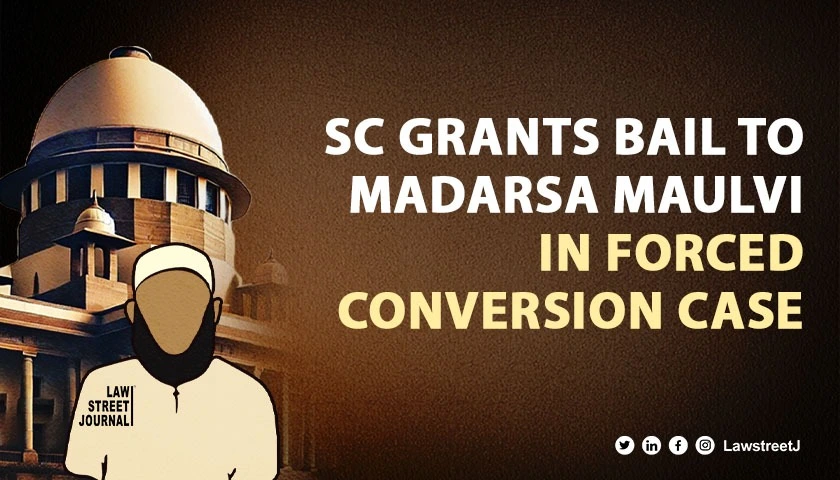NEW DELHI: The Supreme Court on Monday sets aside the Allahabad High Court's order rejecting bail to a 'Maulvi' of a Madarsa, arrested for allegedly converting a mentally retarded minor boy to Islam.
SC Overrules Allahabad HC, Grants Bail in Forced Conversion Case
The apex court observed the bail is a matter of discretion but it does not mean that the judge on his own whims and fancy declines bail saying conversion is something very serious.
"We can understand that the trial court declined bail as trial courts seldom muster the courage of granting bail, be it any offence. However, at least, it was expected of the High Court to muster the courage and exercise its discretion judiciously," a bench of Justices J B Pardiwala and R Mahadevan said.
Maulvi Granted Bail Amid Allegations of Unlawful Religious Conversion
The court granted bail to Maulvi Syed Shad Khazmi alias Mohd Shad who has been in custody for 11 months.
He was arrested by the Uttar Pradesh police in a case lodged in Kanpur Nagar under Sections 504 and 506 of the IPC and other provisions of the Uttar Pradesh Prohibition of Unlawful Conversion of Religion Act, 2021.
Dealing with his plea, the court opined, in fact, this matter should not have reached up to the Supreme Court. The trial court itself should have been courageous enough to exercise its discretion and release the petitioner on bail, it said.
The State counsel said the accused has been arrested for the offence carrying maximum penalty of upto 10 years jail.
The petitioner contended the boy was abandoned on the street and he has given the minor shelter on humanitarian ground.
Upon hearing the counsel, the bench said, "We are of the view that the High Court should have exercised its discretion by granting bail to the petitioner. There was no good reason for the High Court to decline bail. The offence alleged is not that serious or grave like murder, dacoity, rape etc."
The court said it was conscious of the fact that grant of bail is a matter of discretion.
"But discretion has to be exercised judicially keeping in mind the well settled principles of grant of bail. Discretion does not mean that the judge on his own whims and fancy declines bail saying conversion is something very serious. The petitioner is going to be put to trial and ultimately if the prosecution succeeds in establishing its case, he would be punished," the bench said.
The court also said every year so many conferences, seminars, workshops etc are held to make the trial judges understand how to exercise their discretion while considering a bail application as if the trial judges do not know the scope of Section 439 of the CrPC or Section 483 of the BNSS.
The bench said, "At times when the High Court declines bail in the matters of the present type, it gives an impression that altogether different considerations weighed with the presiding officer ignoring the well settled principles of grant of bail."
The court also observed, it failed to understand what harm would have befallen on the prosecution if the petitioner would have been released on bail.
"This is one of the reasons why the High Courts and now unfortunately the Supreme Court of the country is flooded with bail applications," the bench said.
The court said, in one of the matters, it has taken the view that ordinarily once the trial commences, the court should be loath in releasing the accused on bail, but it all depends on the nature of the crime.
"Had it been a case of murder or any other serious offence we would have declined," the bench said.
Although the trial is in progress and the prosecution witnesses are being examined yet it is a fit case to order release of the petitioner on bail subject to terms and conditions that the trial court may deem fit to impose, it said.

















